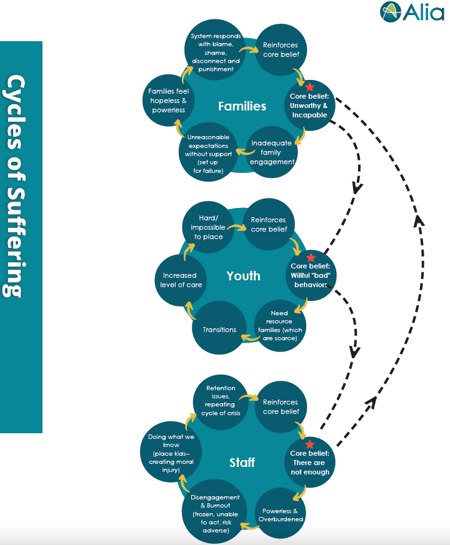Recently, I’ve been trying out some new topics for presentation in an effort to be more direct about the challenges we are facing in child welfare and the incredible effectiveness of the on-the-ground solutions we are using in demonstration projects (seeing reductions in out-of-home care averaging in excess of 70% and residential reductions of more than 50%).
In a recent presentation at the National CASA Conference, I presented on “The Unseen Loops and Links that Hold our System in Place,” which included visual diagrams of the Cycles of Suffering that reinforce our core beliefs about parents, youth, and the workforce experience of “there’s never enough” time, resources, placements, etc.
 As part of this presentation, I shared some of the assumptions that drive our beliefs and keep our current, harmful system in place. Our team has been working hard to elevate our use of systems thinking to illuminate some of the unseen/unspoken assumptions, self-perpetuating behaviors, and “links and loops” that feed the system in a circular manner and continue to produce the same, undesirable results, no matter how hard we try to “reform” or “transform” the system. The good news is that systems can be disrupted at any point to create change—there is more than one way to disrupt the current ways of work, and thereby the outcomes we produce.
As part of this presentation, I shared some of the assumptions that drive our beliefs and keep our current, harmful system in place. Our team has been working hard to elevate our use of systems thinking to illuminate some of the unseen/unspoken assumptions, self-perpetuating behaviors, and “links and loops” that feed the system in a circular manner and continue to produce the same, undesirable results, no matter how hard we try to “reform” or “transform” the system. The good news is that systems can be disrupted at any point to create change—there is more than one way to disrupt the current ways of work, and thereby the outcomes we produce.
Alia’s Managing Director of Transformational Change, Isabel Blanco, has been a great guide and teacher in the systems thinking approach and has helped us all to see things through a new lens. Much of what I write here is reflective of her thinking or ways in which she’s got us all thinking.
Some of those (false) core assumptions are:
- Some parents made bad choices. Parents alone are to blame for their own conditions, “decisions,” and “choices.”
- A parent who can’t keep their child safe deserves punishment; parental maltreatment is seen as parental behavior alone and is intentional in nature.
- Eligibility for help is only legitimized and available if you harm or fail to protect your child; help is based first on placing blame.
- Children are being abused at home and removing them from their parents makes them more safe.
- Children have willful “bad” behavior and make “choices” and “decisions” that result in them needing to be moved from placement to placement.
The child welfare system is nested within a larger set of systems and in order to “solve” what is broken is reliant upon (yet has no locus of control over) those other systems on which solutions rely. Child welfare is not set up to address or heal the root causes of trauma, substance use, mental health, housing, economic insecurity, racism, etc. It’s tool to address issues is separation.
Ironically, our desire to keep “all” kids safe results in higher caseloads which actually makes kids less safe and there will never be “enough” (people, time, money, energy, etc.) to meet the self-perpetuating cycle of our current intervention.
Therefore, we must work to help keep children safely with, not from, their families.
